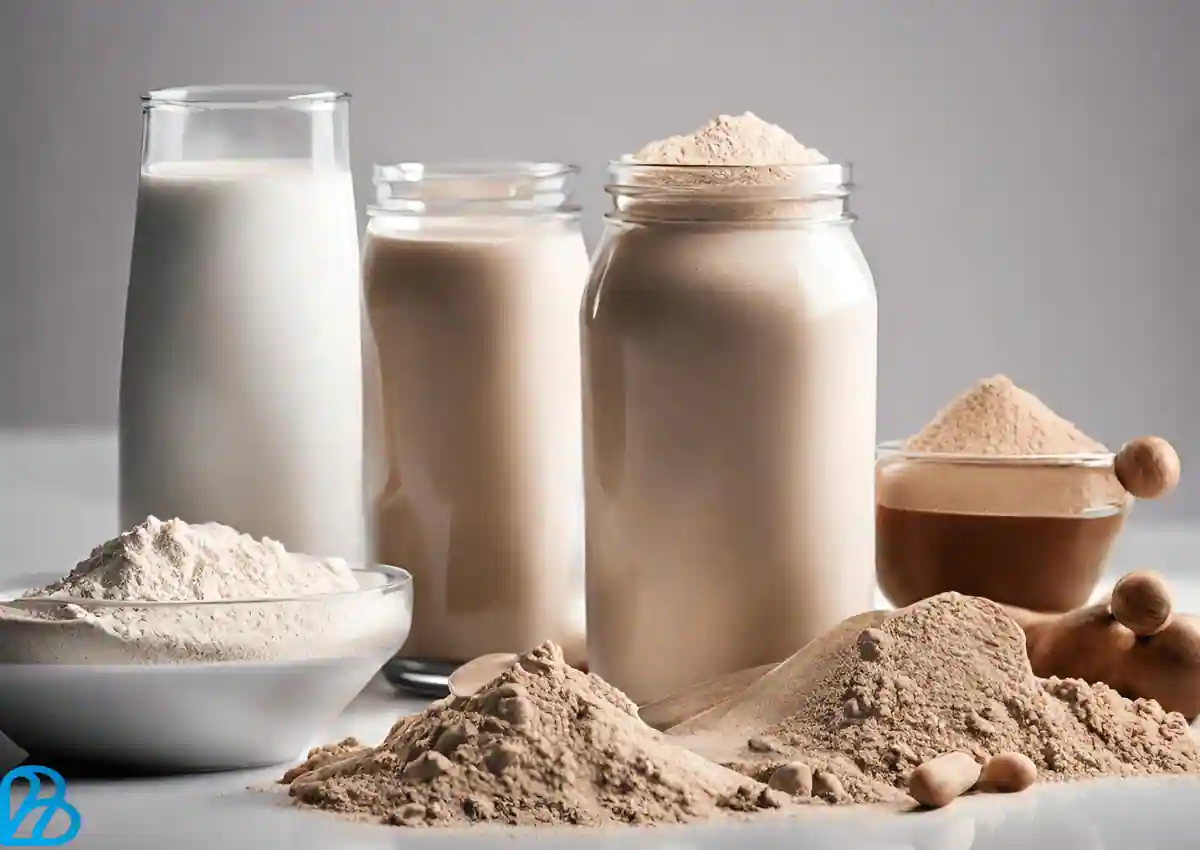Protein Powder for Diet: In the contemporary health and fitness lexicon, few dietary supplements have had their moment, like protein powder. Revered by seasoned athletes, fitness fanatics, and health-conscious individuals, protein powder enjoys the titular throne in the pantheon of performance-enhancing and wellness-supporting supplements.
Introduction- Protein Powder for Diet
Protein powder packed with the promise of muscle gains, speedier recoveries, and an arsenal of other benefits, protein powders have transcended their bodybuilding origins to become a staple in millions’ diets, routines, and lifestyles.
This comprehensive exploration will explore the benefits of incorporating protein powder into your dietary regimen. From the science-backed advantages for muscle growth and recovery to its role in weight management and its potential for bolstering health, this article will provide you with all the information you need to make an informed decision about this popular health supplement.
– Benefits for Muscle Building and Recovery
For anyone whose fitness journey is defined by the maxim ‘no pain, no gain,’ protein powder is a faithful ally, keeping the muscles fed and the body ready for the next challenge.
1. Enhanced Muscle Growth
Regarding reinforcing those biceps and breaking the plateau in your squat, protein powder can be a game-changer. Muscles need protein to repair and rebuild after strenuous exercise, and a protein-rich snack or shake post-workout can enhance these processes, leading to increased muscle growth over time.
High-quality protein powders, mainly those rich in essential amino acids, are ideal for triggering muscle protein synthesis, the process by which the body builds new muscle tissue. For those aspiring to create a more substantial physique, adding a protein shake to their daily intake can be invaluable.
2. Improved Muscle Recovery
Beyond high-intensity training, consistent exercise can take a toll on the body. Protein powder aids in the repair of muscle fibers, decreasing recovery time and ensuring muscles are ready for the next session. This benefit is especially pronounced in the case of weightlifting and endurance training, where muscular fatigue is common.
3. Reduced Muscle Soreness
Known colloquially as ‘the day after leg day,’ delayed onset muscle soreness (DOMS) is a frequent deterrent to training at peak capacity. By consuming a protein shake within the post-exercise window, individuals often report a reduction in the severity of muscle soreness, allowing them to maintain regular workouts without the burden of excessive discomfort.
Also Read- Health Benefits of Spinach Juice for a Nutrient-Packed Lifestyle

– Weight Management: A Protein Powder Ally
Protein’s role in weight management has been a subject of much research, and the conclusions are robust. Protein powder can be a beacon of stability for those navigating the complex terrain of dietary trends and weight goals.
1. Increased Satiety and Reduced Appetite
A diet that includes adequate protein has been shown to increase the feeling of fullness and reduce subsequent hunger pangs. When consumed as part of a meal or as a snack, protein powders can extend the duration of satiety, potentially decreasing overall calorie intake.
2. Enhanced Fat Burning and Weight Loss
Proteins’ high thermic effect means the body expends more energy (calories) in metabolizing proteins than carbohydrates or fats, which might contribute to increased weight loss. Moreover, the maintenance of lean muscle mass during a caloric deficit, often during weight loss, can be supported by additional protein intake.
3. Preservation of Lean Muscle Mass During Weight Loss
One of the benefits of diet-induced weight loss is maintaining as much lean muscle mass as feasible. Protein powders can assist in this domain, helping to curb the catabolic effects of calorie restriction and maintaining that hard-earned lean mass while primarily losing body fat.
Also Read- The Ultimate 7-Day Diet Plan for Weight Loss

– Convenience and Versatility of Protein Powders
In our fast-paced world, convenience often dictates the menu. Protein powder’s ease of use and adaptability make it a non-negotiable asset for busy bees and on-the-go lifestyles.
1. Quick and Easy Nutrition
In a world that favors speed over all else, protein powders offer a rapid, hassle-free alternative to elaborate meal preparation. A simple scoop, a splash of liquid, and a quick shake or stir can deliver the protein punch required to keep you going through the day’s rigors.
2. Flexible Integration in Meals and Recipes
One of the most appealing aspects of protein powder is its adaptability. Beyond the traditional shake, you can seamlessly blend protein powder into smoothies, stir into oatmeal, use in baking, or make protein pancakes. This versatility means you can add to virtually any meal.
3. Ideal for On-The-Go Lifestyles
From the commuter to the professional on a tight schedule, the portability of protein powder makes it an ideal option for those who need their nutrition served up swiftly. A shaker cup loaded with powder can accompany you anywhere, from the boardroom to the wilderness of the great outdoors.
Also Read- Winter Flu Season- 10 Home Remedies for Beating the Flu This Winter–

– Potential Health Benefits of Protein Powder
The advantages of protein powder extend beyond the realms of fitness and physique. Emerging research illuminates its potential for holistic health promotion.
1. Support for Bone Health
Some protein powders, particularly those derived from animals, contain calcium, a mineral critical for bone health. Regularly consuming these protein sources can contribute to the recommended daily calcium intake, supporting sound skeletal structure.
2. Improved Immune Function
Protein powders contain amino acids crucial in maintaining the immune system’s integrity. A diet rich in these building blocks can help maintain a robust immune response, keeping you fitter and healthier year-round.
3. Reduced Risk of Chronic Diseases
Studies attribute the decreased risk of various chronic diseases to diets high in protein. The function of protein in controlling weight and its potential anti-inflammatory effects may explain this.
– Choosing the Right Protein Powder for You
With the supplement market awash with a cacophony of options, selecting the suitable protein powder can be as perplexing as vital. Here are some guidelines to help you navigate the aisles.
1. Different Types of Protein Powders
Whey protein, casein, egg white, soy, and pea protein are the most common protein powders, each with unique attributes and ideal applications. Whey, for example, is fast-digesting and suitable for post-workout recovery, while casein, a slower-digesting protein, is best consumed before bed.
2. Considerations for Dietary Restrictions and Preferences
People who are lactose intolerant or would rather eat a plant-based diethave various options. The market offers protein powders that cater to these specifications, they ensure that dietary requirements are met without compromise.

– Potential Side Effects of Protein Powders
Although protein powders are often thought to be safe for most people when used appropriately, they are not without potential side effects.
1. Digestive Issues
Some individuals may experience bloating, gas, or stomach cramps, particularly with protein powders derived from dairy, such as whey or casein. People with lactose intolerance may experience these symptoms more severe.
2. Allergic Reactions
Individuals allergic or sensitive to particular ingredients contained in some protein powders may experience symptoms ranging from mild rashes to severe anaphylaxis. Always check the ingredient list if you are prone to food allergies.
3. Nutrient Deficiency
Relying too heavily on protein powders for protein intake could lead to deficiencies in other nutrients, such as fibre, minerals, and vitamins, which are additional nutrients in whole meals.
4. Overconsumption of Protein
Although protein is essential for both muscle development and repair, consuming excessively high amounts can lead to potential health issues, such as kidney damage, particularly in people with pre-existing kidney conditions.
As with any dietary supplement, it’s essential to use protein powders as part of a balanced diet, not as a replacement for whole foods. Always consult with a healthcare professional before beginning any new supplement regimen.
Conclusion: Embracing Protein Powder as a Partner in Health
The benefits of protein powder are as vast as they are varied. Whether you aspire to build a formidable physique, maintain a healthy weight, or bolster your general health, including a high-quality protein powder in your dietary routine can be a potent ally in achieving your goals.
It’s important to note that protein powder is not a miracle substance. A wholistic strategy for health that incorporates a balanced diet, adequate hydration, regular exercise, and sound sleep — yields the best, most sustainable results.
As with any lifestyle change, it’s advisable to speak with a licensed dietitian or doctor to customize your protein powder consumption to your individual needs and goals.
Let the science guide your choices and reap the bountiful rewards that protein powder can offer. Whether you blend it into your morning smoothie, stir it into your post-lifting refuel, or sip it during a midday bustle, protein powder is poised to power up your life in ways that transcend the ordinary supplement narrative.
Hi there! I’m content writer and blogger. With over two years of experience, I’ve shared my passion for writing across various platforms. I firmly believe in the transformative power of words and look forward to sharing this journey with you. Enjoy my work!










